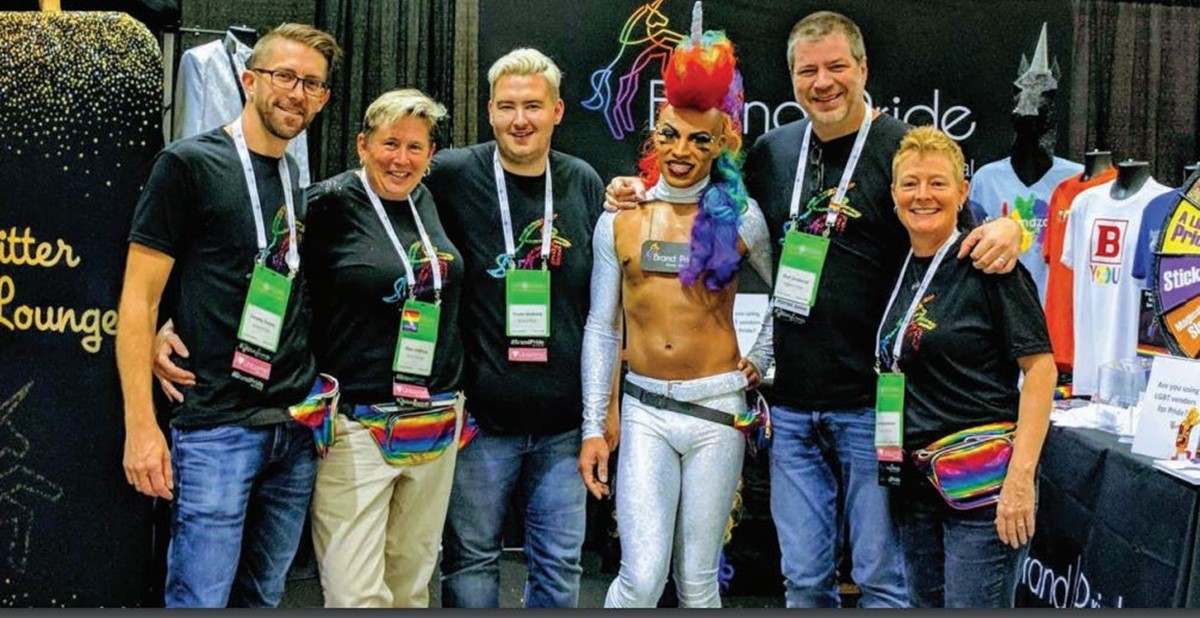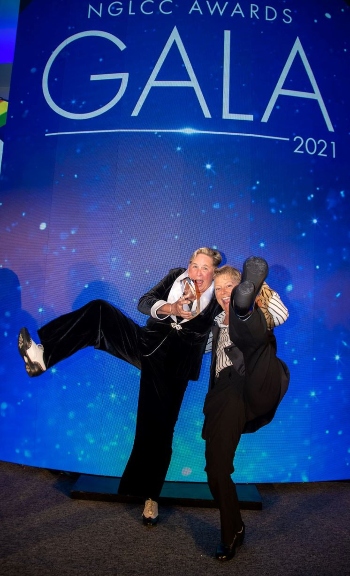Pride Is All Year At This LGBTQ+-Owned Distributor

Brand|Pride Team
Cue the rainbows—Pride Month is here. Around the world, the month-long celebration honors LGBTQ+ culture, achievements and activism. But, for Washington-based distributor Brand|Pride (PPAI 782254, D4), Pride is all year.
Brand|Pride was founded in 2000 by a couple, Elise Lindborg and Kelli Henderson. “Twenty-two years ago, we did not want to be known as the “gay promotional merchandise” company,” Lindborg says. “At that time, our biggest fear was clients not wanting to do business with us because we were a gay company. There was a sincere fear of rejection and discrimination simply for being two lesbians selling promotional merchandise.”
When they first opened their business, Lindborg and Henderson were not allowed to get married or even visit each other in the hospital. “My wife and I are now legally married, and we live in a state where we are fully protected from any sort of discrimination,” Lindborg says. “However, in 2022, we are seeing the most anti-LGBTQ bills introduced across the United States ever than before.”

In 2022, more than 300 bills described as “anti-LGBTQ” by the activist organization Human Right Campaign are pending across state legislatures. In 27 states, it’s still legal to discriminate against LGBTQ individuals in housing, employment and public accommodations. Lindborg says, “The fight for LGBTQ rights and protections is not over.”
Brand|Pride’s clients are mostly Fortune 500 companies who are proud supporters of the National Gay Lesbian Chamber of Commerce (NGLCC). “Even though these companies are supportive of the LGBTQ community, we discovered that only 6% of Fortune 500 companies use a LGBTQ vendor for Pride,” Lindborg says “Over the past two years Brand|Pride is slowly changing this unacceptable statistic. Our goal is to get 100% of the Fortune 500 companies to use LGBTQ vendors for their Pride merch by 2030.”
Brand|Pride is also the only certified LGBTQ business to be named the NGLCC’s prestigious Supplier of the Year twice, in 2013 and 2021.

During the months of April, May and June, Lindborg says her team lives, eats and breathes rainbows. “We are so busy with Pride orders that we can’t even think straight! Sales this year compared to last year have doubled. We expect that next year our Pride orders will quadruple,” she says.
Brands are actively seeking out their company. Kelli Henderson says, “This year, we have received an unprecedented number of inquiries from corporations that want to do business with Brand|Pride.”
But companies aren’t only changing their buying habits. “Their internal DEI goals are being implemented and reinforced by purchasing managers, BRG leadership, members and staff,” Henderson says. “They are spending intentionally to ensure economic inclusion and lifting up marginalized businesses and the communities those businesses support.”
For Brand|Pride, there’s never too much glitter and rainbows. Lindborg says, “Pride month is an opportunity for our business to shine and help large corporations be truly inclusive of the LGBTQ community. It’s also a time that we get together with our LGBTQ friends and allies and celebrate our wins and get ready to fight for 100% equal rights. As red blooded, tax paying Americans, we deserve equal rights and no more discrimination.”

Lindborg says she loves to see corporations support Pride. “The more allies the LGBTQ community has, the better. When corporations show up for Pride, it means they see their LGBTQ employees as a valuable member of their staff and society,” she says.
One of Henderson’s favorite quotes is by Ekaterina Walters: If you do not intentionally include, you unintentionally exclude.
But there’s also a downside as Pride becomes more mainstream. “Participation in Pride is appreciated, however, many of these companies are only showing up because they know their participation in Pride gives them access to the $917 billion dollar buying power of the LGBTQ community,” Lindborg says. “Not only that, they also know that LGBTQ consumers are 75% more likely to purchase goods and services from brands that demonstrate inclusion.”
For companies looking to participate in Pride, Lindborg warns against “rainbow washing.” Rainbow-washing happens when a business publicly shows support for the LGBTQ community by slapping a rainbow on a product or changing the company logo, but privately engages in practices that are detrimental to the community, like donating money to anti-LGBTQ representatives.
Lindborg says, “Companies need to dig deeper and spend intentionally with LGBTQ vendors to be truly inclusive of the LGBTQ community. Companies need to make sure their internal policies protect and support their LGBTQ employees as well as stop financially supporting anti-LGBTQ legislation and anti-LGBTQ congress people.”
Raising awareness is great, but community investment makes a greater difference. “Companies showing up and claiming they are inclusive is great, but economic inclusion is what lifts and sustains our community,” Lindborg says. “We want to make sure these companies walk the talk and spend their Pride marketing funds intentionally with a LGBTQ promotional merchandise company. We want them to really think about where they are spending their Pride funds and stop lining the pockets of non-LGBTQ vendors.”
For clients who truly want to be diverse, equitable and inclusive, Lindborg asks them to put their money where their ideals are. She says, “Seek out and use LGBTQ vendors for their Pride activations. Stop lining the pockets on non-gay vendors. LGBTQ people and vendors like Brand|Pride have been fighting for equal rights for decades.
“We are the ones fighting and giving back to our community. Companies need to show their support by not just showing up but by also spending intentionally and supporting the LGBTQ community through economic inclusion.”

